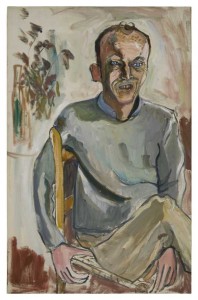
The face of Frank O’Hara in this portrait by Alice Neel is in its way shocking. With his bad teeth, sharp nose and wild eyes the New York poet appears ugly at first, even repellent.
There is no composure in this likeness and his expression is raw. But with all its imperfections, his face is also vulnerable. It is this which makes it difficult to look at, which makes it burdensome.
For all the laughter, O’Hara appears unguarded here and we cannot turn away from such nudity. It must have been a face like this which philosopher Emmanuel Levinas had in mind when he spoke about the concept as follows: “The relation to the face is a relation to the absolutely weak, to what is absolutely exposed, naked and destitute.â€
Levinas also said the face was not to be confused with a portrait, but there are surely portraits and portraits. Neel does not immortalise her subjects, indeed quite the opposite. If anyone could prise away the mask and put us face to face with another human being, she could.
Elsewhere it has been written that this portrait shows something bordering on dislike, which can coexist with pity; read a review by Adrian Searle in the Guardian here. Neel is the subject of a major show at Whitechapel at the moment and there is a review by Robin Blake in the FT, here, and one by Laura McClean-Ferris in The Independent here.
Alice Neel – Painted Truths is currently at Whitechapel Gallery until September 17.
No Comments